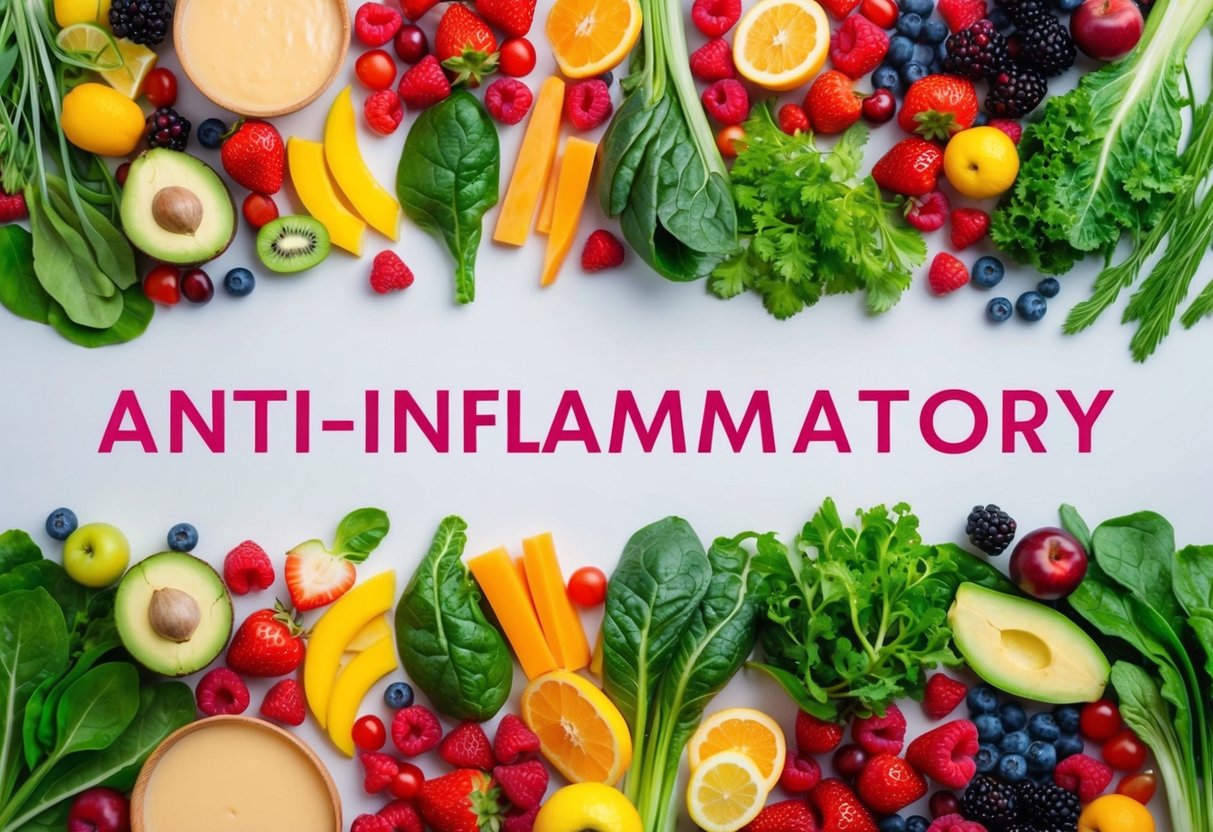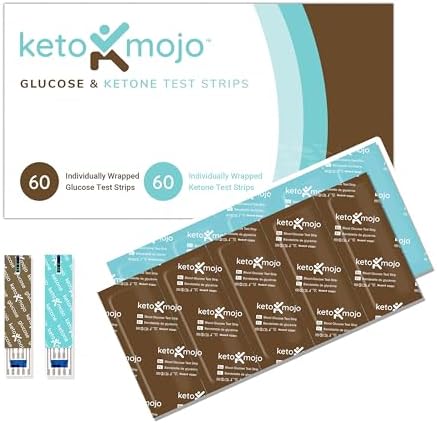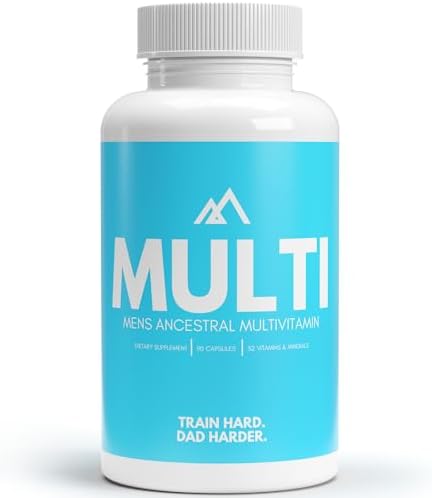Keto and Inflammation: How Low-Carb Nutrition Helps Reduce Chronic Inflammation
This post contains affiliate links. If you make a purchase through these links, I may earn a small commission at no extra cost to you. Learn more.
Chronic inflammation is a common health problem many people face today. It can lead to a variety of conditions such as arthritis and heart disease.
A ketogenic diet, which is low in carbohydrates, might be a powerful tool to help reduce inflammation.
Cutting back on carbs while following a keto diet can minimize inflammation in the body.
This approach may also ease the symptoms of chronic pain, fostering better overall well-being.

The keto diet focuses on high-fat, moderate protein, and low-carb intake. This balance helps the body enter a state called ketosis, where it burns fat for energy instead of carbohydrates.
This process reduces oxidative stress and inflammation, benefiting those with inflammatory conditions.
Research has shown that the reduction in insulin levels and increase in ketone bodies can help manage inflammation effectively.
Many people report improvements in their health and a decrease in inflammation-related issues when they adopt a ketogenic lifestyle.
While it may not work for everyone, the potential benefits of keto make it worth exploring for those struggling with chronic inflammation.
Understanding how keto impacts gut health, blood sugar, and insulin levels can reveal why it’s such an appealing option.
Start your anti-inflammatory keto journey today with our 7-Day Custom Keto Meal Plan.
Unlock personalized insights with our Custom Keto Diet program and master your metabolism!
Key Takeaways
- Low-carb diets like keto may reduce inflammation.
- Entering ketosis helps manage blood sugar and insulin.
- Keto supports gut health and reduces oxidative stress.
Understanding Keto and Inflammation

The ketogenic diet has gained attention for its potential to lower inflammation by producing ketones. These molecules can help manage chronic conditions like heart disease and obesity.
The Role of Ketones in Reducing Inflammation
Ketones are the molecules produced when the body burns fat for fuel, a process triggered by a keto diet.
High-fat, low-carb nutrition leads to the production of beta-hydroxybutyrate (BHB), a key ketone.
BHB can reduce inflammation by blocking certain proteins that cause swelling. It helps lower activity in the nervous system, which might ease symptoms of neuroinflammation. This is important for conditions like multiple sclerosis.
The diet’s impact on insulin can also be crucial.
By lowering insulin levels, the diet may reduce inflammation markers in the body. This process can positively affect overall metabolic health.
Follow our post on Understand Keto Adaptation Timeline: Key Process and Success Strategies for more information about ketogenic diet.
Keto Diet and Chronic Diseases
A ketogenic diet might benefit various chronic diseases by addressing underlying inflammation.
For instance, it can help with weight loss, reducing the risk of obesity-related conditions. This includes improving metabolic health and, potentially, lowering heart disease risk.
For Alzheimer’s disease, the diet’s ability to reduce inflammation in the brain presents possible benefits. Managing blood sugar levels can also help, as these are linked to inflammation.
Research suggests that some autoimmune diseases, like multiple sclerosis, might improve with a keto diet. Ketones could reduce the inflammation that worsens these conditions. This makes the diet a viable nutritional approach for managing certain chronic disorders.
Support your keto journey with an MCT Oil Powder for faster ketone production
Managing Blood Sugar and Insulin Levels with Keto

A ketogenic diet has been linked to significant effects on blood sugar and insulin management.
This type of diet is low in carbohydrates and high in fats, which may help individuals manage diabetes and improve insulin sensitivity.
The Impact of Carbohydrate Intake on Blood Sugar
Carbohydrate intake plays a crucial role in blood sugar regulation. When carbohydrates breakdown, they convert to glucose, which raises blood sugar levels.
On a ketogenic diet, the intake is dramatically reduced, which leads to lower blood sugar spikes.
By limiting carbohydrates, the body uses ketone bodies as an alternative energy source. This shift often results in more stable blood glucose levels.
For people with diabetes, this can be particularly beneficial, as it reduces the frequency and severity of blood sugar fluctuations.
Read our article about keto and blood sugar to find out Is Keto Safe for Diabetics: Exploring Health Impacts and Considerations.
Insulin Sensitivity and Resistance on a Ketogenic Diet
Insulin sensitivity refers to how effectively the body uses insulin. Improved sensitivity means the body needs less insulin to manage blood sugar.
A ketogenic diet can enhance insulin sensitivity, making it easier to control insulin levels.
Insulin resistance, which is a hallmark of Type 2 Diabetes, can improve with a ketogenic diet.
Studies suggest that the reduction in carbohydrates may help mitigate insulin resistance. This change aids in managing diabetes and could potentially reduce the dependency on insulin medications.
Try a Blood Ketone & Glucose Monitor to track your keto progress!
Keto, Gut Health, and Inflammation

The ketogenic diet may impact gut health and inflammation. This connection can affect conditions like leaky gut syndrome and chronic inflammation, showcasing a potential health strategy for those facing such issues.
The Role of Gut Microbiome in Inflammation
The gut microbiome, a collection of microorganisms living in the digestive tract, plays a key role in regulating inflammation.
When the balance of these microorganisms is upset, it can lead to an increase in inflammation-related diseases.
A ketogenic diet, known for its high fat and low carbohydrate content, has been shown to alter the composition of the gut microbiome favorably.
A well-balanced gut microbiome often results in the reduction of inflammatory markers.
Research has suggested that ketogenic diets could decrease the levels of gut bacteria associated with inflammation, contributing to an improved gut environment. These changes can help manage chronic inflammation, thus showing the importance of maintaining a healthy gut through diet.
For more information about keto and gut health, learn from our guide on Keto and Gut Health: Unlock Microbiome Secrets for Optimal Weight Loss & Boosted Energy.
Keto and Leaky Gut Syndrome
Leaky gut syndrome refers to a condition where the gut lining becomes permeable, allowing unwanted substances to enter the bloodstream. This can trigger inflammation and immune responses.
The ketogenic diet’s ability to modify gut bacteria may be beneficial for those dealing with leaky gut syndrome.
By reducing inflammation in the gut, a ketogenic diet can potentially repair and maintain the gut lining’s integrity. This prevention of unwanted substances crossing the gut barrier may reduce immune reactions.
The combination of low carbs and high fats in keto supports gut health, offering a promising dietary approach for individuals with leaky gut concerns.
Dietary Components of a Keto Diet

A ketogenic diet focuses on reducing carbs and increasing fats to trigger ketosis. This type of diet includes healthy fats, specific protein sources, and low-carb vegetables and fruits, all of which can help reduce inflammation.
Healthy Fats and Their Anti-Inflammatory Effects
Healthy fats are a key part of the keto diet. They help reduce inflammation and provide energy.
Foods rich in healthy fats include avocado, nuts, and seeds.
These foods are high in omega-3 fatty acids, which can decrease inflammatory markers in the body.
Salmon is another excellent choice, being rich in omega-3s. These fats support heart health and reduce inflammation.
Olive oil is also beneficial due to its anti-inflammatory properties.
Incorporating these fats in the diet may help manage chronic inflammation effectively.
Protein Sources and Their Impact on Inflammation
Proteins in a keto diet should come from quality sources.
Fish such as salmon and shrimp are excellent options, as they are low in carbs and high in anti-inflammatory omega-3s.
Meat and cheese can also be included, but choosing grass-fed and organic where possible is optimal.
Greek yogurt and cream offer protein and healthy fats. However, they should be consumed in moderation due to their higher carb content.
These protein sources not only fuel the body but can also help reduce inflammation when included in a balanced way.
Find the best selling healthy fat and protein from Amazon below.
Low-Carb Vegetables and Fruits in a Keto Diet
Low-carb vegetables and fruits are crucial for getting essential nutrients without spiking blood sugar.
Dark leafy greens like spinach and kale are packed with antioxidants and vitamins. These vegetables support immune health and have anti-inflammatory effects.
For fruits, options are limited due to sugar content, but berries are a good choice in moderation.
Berries are rich in antioxidants, which help combat inflammation.
These plant-based options ensure nutrient diversity in a keto diet, aiding in inflammation control while maintaining low carbohydrate intake.
Learn more about keto and vegetables from our guide on Keto Diet Vegetables: Discover the Top Low-Carb Choices for Ketosis.
Keto Lifestyle Considerations

Adopting a ketogenic lifestyle involves more than just dietary changes. It requires integrating exercise, exploring intermittent fasting, and planning balanced meals to maintain ketosis while addressing potential challenges like the keto flu and water weight fluctuations.
Integrating Exercise with a Ketogenic Diet
Exercise is an important part of any healthy lifestyle, including when on a ketogenic diet.
Fitness activities can help burn calories and manage weight. Regular exercise supports overall health and may enhance the benefits of ketosis.
When starting a keto diet, individuals may experience changes in energy levels.
Initial adaptations, often called the “keto flu,” can cause temporary fatigue. Staying hydrated and consuming electrolytes can alleviate these effects.
Low-intensity and aerobic activities, like walking or swimming, can initially help during the transition phase.
Listening to your body and gradually increasing intensity as energy levels stabilize is key.
Our guide on Keto and Exercise: Optimize Low-Carb Workouts Effectively, will help you go through your keto journey successfully.
Intermittent Fasting and Keto: A Synergistic Approach
Combining intermittent fasting with a ketogenic diet might amplify health benefits.
Intermittent fasting involves cycling between periods of eating and fasting. This approach is shown to enhance ketosis, as it helps the body tap into fat stores for energy.
The synergy of fasting and ketosis can improve insulin sensitivity, support weight management, and potentially enhance brain function.
It’s essential to tailor fasting periods to one’s lifestyle, balancing calorie intake to avoid nutritional deficiencies.
Some popular fasting methods include the 16:8 method, where eating is confined to an 8-hour window, allowing the body a 16-hour fasting period.
Find out in depth guide about keto and intermittent fasting here.
Meal Planning and Recipes for Sustained Ketosis
Effective meal planning ensures nutritional needs are met while maintaining ketosis.
Meals should focus on high-fat, moderate-protein, and low-carb ingredients.
A practical meal plan includes breakfast eggs sautéed with spinach, lunch with cauliflower rice and grilled chicken, and dinner featuring a salmon salad topped with avocado. Snacks might be small portions of nuts or cheese.
Proper meal planning helps prevent unintentional excess calorie intake.
It’s also essential in combating water weight variations.
Lean protein sources, healthy fats like olive oil or avocado, and low-carb diet staples help keep the body in ketosis while providing necessary nutrients.
Need tailored advice? Our Custom Keto Diet plan offers personalized support for own lifestyles.
Potential Risks and How to Mitigate Them

The ketogenic diet, although effective for reducing inflammation, can pose some risks. These include issues with long-term safety and nutrient deficiencies that require careful management.
Long-Term Safety and Efficacy of Keto Diets
The long-term safety of the keto diet is still under investigation. Some concerns revolve around heart health, as the diet is often high in saturated fat, which could affect cholesterol levels.
It’s essential to monitor these levels regularly.
Balancing fats from both animal and plant-based foods can help manage this risk.
Although there is potential for a positive impact on gut microbiota, continuous research is necessary to understand the full implications.
Nutrient Deficiencies and How to Prevent Them
Following a ketogenic diet might lead to nutrient deficiencies due to limited food diversity. Essential vitamins and minerals like magnesium, calcium, and potassium may be lacking.
To prevent deficiencies, incorporating a variety of low-carb vegetables is crucial.
Supplements can also support missing nutrients.
Prevent deficiencies with Keto-Friendly Multivitamins!
Individuals should consult healthcare providers to tailor the diet to their needs, ensuring they maintain a balanced intake of necessary nutrients.
Frequently Asked Questions
The ketogenic diet is known for its potential to reduce inflammation through a low-carb, high-fat nutritional approach. Subtopics include foods to eat, the impact on autoimmune conditions, and how it can affect overall health and inflammation.
What foods are included in an anti-inflammatory ketogenic meal plan?
An anti-inflammatory ketogenic meal plan typically includes foods like leafy greens, avocados, fatty fish, nuts, and seeds.
These foods are rich in healthy fats and nutrients that may help reduce inflammation.
How does a ketogenic diet impact autoimmune diseases according to recent studies?
Recent studies suggest that a ketogenic diet may reduce the symptoms of some autoimmune diseases by lowering inflammation.
Research indicates that limiting carbohydrates can lead to decreased inflammatory markers in the body.
What are some anti-inflammatory keto-friendly breakfast options?
Keto-friendly breakfast options that may help reduce inflammation include omelets with spinach and avocado, chia seed puddings, and smoothies with leafy greens and coconut milk.
These meals are high in healthy fats and low in carbs.
Can following a ketogenic diet help alleviate chronic inflammation?
Following a ketogenic diet can help alleviate chronic inflammation by shifting the body into a state of ketosis, where fat is used for energy instead of carbohydrates.
This shift can lower insulin levels and inflammatory mediators.
How does a low-carb dietary approach influence overall well-being and pain reduction?
Low-carb dietary approaches like keto can improve overall well-being by stabilizing blood sugar levels and reducing inflammation.
Many people report experiencing less joint and muscle pain due to these changes.
Are there any specific keto recipes designed to combat inflammation?
Specific keto recipes that may combat inflammation include salmon with lemon and dill, cauliflower rice with turmeric, and avocado salad with olive oil.
These recipes use ingredients known for their potential anti-inflammatory effects.
How quickly can you see anti-inflammatory benefits on a keto diet?
The anti-inflammatory benefits of a keto diet can vary from person to person. Some individuals may see improvements in inflammation within a few weeks, while others may take longer to experience noticeable changes.
What supplements can enhance keto’s anti-inflammatory effects?
Supplements like omega-3 fatty acids, vitamin D, and turmeric may enhance the anti-inflammatory effects of a ketogenic diet.
These supplements can help reduce inflammatory responses in the body and complement a low-carb lifestyle.
Conclusion
A ketogenic diet focuses on reducing carbohydrate intake to induce ketosis, where the body uses fat for energy.
This diet lowers insulin levels and supports beta-hydroxybutyrate (BHB) production, which can decrease inflammation.
Studies indicate that this approach may help lower markers of inflammation, aiding in lessening chronic pain.
By limiting carbs, the body may experience reduced oxidative stress, contributing to improved overall well-being.
Some research suggests that a ketogenic diet might ease symptoms linked to inflammatory conditions through specific biochemical changes.
Individuals considering this diet should consult with healthcare providers to ensure it meets their health needs.
Take the next step in your health journey—start your Custom Keto Diet Plan today!











